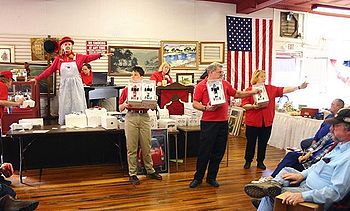The Business and Economics Portal Business is the practice of making one's living or making money by producing or buying and selling products (such as goods and services). It is also "any activity or enterprise entered into for profit." A business entity is not necessarily separate from the owner and the creditors can hold the owner liable for debts the business has acquired. The taxation system for businesses is different from that of the corporates. A business structure does not allow for corporate tax rates. The proprietor is personally taxed on all income from the business. A distinction is made in law and public offices between the term business and a company such as a corporation or cooperative. Colloquially, the terms are used interchangeably. (Full article...) Economics (/ˌɛkəˈnɒmɪks, ˌiːkə-/) is a social science that studies the production, distribution, and consumption of goods and services. Economics focuses on the behaviour and interactions of economic agents and how economies work. Microeconomics analyses what is viewed as basic elements within economies, including individual agents and markets, their interactions, and the outcomes of interactions. Individual agents may include, for example, households, firms, buyers, and sellers. Macroeconomics analyses economies as systems where production, distribution, consumption, savings, and investment expenditure interact, and factors affecting it: factors of production, such as labour, capital, land, and enterprise, inflation, economic growth, and public policies that have impact on these elements. It also seeks to analyse and describe the global economy. (Full article...) Selected article Microsoft Corporation, or often just MS, is an American multinational computer technology corporation with 79,000 employees in 102 countries and global annual revenue of US $51.12 billion as of 2007. It develops, manufactures, licenses and supports a wide range of software products for computing devices. Headquartered in Redmond, Washington, USA, its best selling products are the Microsoft Windows operating system and the Microsoft Office suite of productivity software. These products have prominent positions in the desktop computer market, with market share estimates as high as 90% or more as of 2003 for Microsoft Office and 2006 for Microsoft Windows, in line with Bill Gates's vision "to get a workstation running our software onto every desk and eventually in every home". Founded to develop and sell BASIC interpreters for the Altair 8800, Microsoft rose to dominate the home computer operating system market with MS-DOS in the mid-1980s. The company released an initial public offering (IPO) in the stock market, which, due to the ensuing rise of the stock price, has made four billionaires and an estimated 12,000 millionaires from Microsoft employees. Throughout its history the company has been the target of criticism for various reasons, including monopolistic business practices—both the U.S. Justice Department and the European Commission, among others, brought Microsoft to court for antitrust violations and software bundling. Microsoft has footholds in other markets besides operating systems and office suites, with assets such as the MSNBC cable television network, the MSN Internet portal, and the Microsoft Encarta multimedia encyclopedia. The company also markets both computer hardware products such as the Microsoft mouse and home entertainment products such as the Xbox, Xbox 360, Zune and MSN TV. Known for what is generally described as a developer-centric business culture, Microsoft has historically given customer support over Usenet newsgroups and the World Wide Web, and awards Microsoft MVP status to volunteers who are deemed helpful in assisting the company's customers. Selected image
Selected economyThe economy of Myanmar is the seventh largest in Southeast Asia. After the return of civilian rule in 2011, the new government launched large-scale reforms, focused initially on the political system to restore peace and achieve national unity and moving quickly to an economic and social reform program. Current economic statistics were a huge decline from the economic statistics of Myanmar in the fiscal year of 2020, in which Myanmar’s nominal GDP was $81.26 billion and its purchasing power adjusted GDP was $279.14 billion. Myanmar has faced an economic crisis since the 2021 coup d'état. (Full article...) Selected quoteHeroism and the respect it commands is a form of compensation by society for those who take risks for others. And entrepreneurship is a risky and heroic activity, necessary for growth or even the mere survival of the economy. It is also necessarily collective on epistemological grounds-to facilitate the development of expertise. Someone who did not find something is providing others with knowledge, the best knowledge, that of absence (what does not work)-yet he gets little or no credit for it. He is a central part of the process with incentives going to others and, what is worse, gets no respect. I am an ingrate toward the man whose overconfidence caused him to open a restaurant and fail, enjoying my nice meal while he is probably eating canned tuna. In order to progress, modern society should be treating ruined entrepreneurs in the same way we honor dead soldiers, perhaps not with as much honor, but using exactly the same logic (the entrepreneur is still alive, thought perhaps morally broken and socially stigmatized, particularly if he lives in Japan.) For there is no such thing as a failed soldier, dead or alive (unless he acted in a cowardly manner)-likewise, there is no such thing as a failed entrepreneur or failed scientific researcher, any more than there is a successful babbler, philosophaster, commentator, consultant, lobbyist, or business school professor who does not take personals risks. (Sorry.) Psychologists label "overconfidence" a disease, blinding people to the odds of success when engaging in ventures. But there is a difference between benign, heroic type of risk taking that is beneficial to others, in the antifragile case and the nastier modern type related to negative Black Swans, such as the overconfidence of "scientists" computing the risks of harm from the Fukushima reactor. In the case of the former, what they call overconfidence is a good thing, not something to medicate.
TopicsRelated WikiProjectsDid you know (auto-generated) -
On this day in business history
General imagesThe following are images from various business-related articles on Wikipedia.
More did you know
Business news Wikinews Economy and business portal
|






































